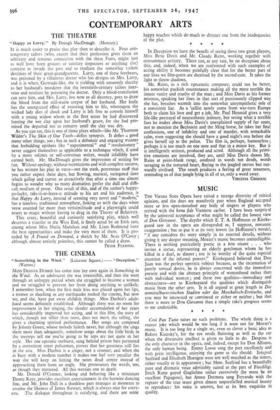THE CINEMA
"Something in the Wind." (Leicester Square.) — "Deception." (Warner.)
Miss DEANNA DURBIN has come into her own again in Something in the Wind. As an adolescent she was irresistible, and then she went through an unhappy period when she struggled to become a woman and we struggled to prevent her from doing anything so unlikely. I remember how, when the first male kiss was placed upon her lips, a tremor as shocking as any earthquake rocked the cinema, but now we, and she, have put away childish things. Miss Durbin's adult- hood seems definitely established. Although there was no room for improvement in her singing, the slender accumulation of her years has considerably improved her acting, and in this film, the story of which, though not sillier than most, does not merit the telling, she gives a charming spirited performance. Her songs are composed by Johnny Green, whose melody faileth never, but although she sings them more than adequately, somehow songs about the little birds in the treetops tell me you're going to be tops are not quite in her style. Her one operatic outburst, sung behind prison bars partnered by a convenient tenor policeman, proves that her greatness still lies in the aria. Miss Durbin is a singer, not a crooner, and when she is busy with a modern number it makes one feel very peculiar the way she will keep on hitting the notes dead centre instead of approaching them from an angle. She pronounces the words, too, as though they mattered. All this worries one to death.
Mr. Donald O'Connor, looking and behaving like a miniature Danny Kaye, provides excellent entertainment in the haywire dancing line, and Mr. John Dall in a thankless part manages at moments to assume the likeness a James Stewart, which is always nice for every- one. The dialogue throughout is satisfying, and there are some
happy touches which do much to distract one from the inadequacies of the plot. * *
In Deception we have the benefit of seeing those two great players, Miss Bette Davis and Mr. Claude Rains, working together with consummate artistry. There can, at any rate, be no deception about this, and, indeed, when we are confronted with such examples of acting ability it becomes painfully clear that for the better part of our lives we film-goers are deceived by the second-rate. It takes the light to throw shadows.
Mr. Rains, as a rich egocentric composer, could not be better, his somewhat puckish countenance making all the more terrible the innate vanity and cruelty of the man ; and Miss Davis as his former mistress, speaking her lines in that sort of passionately clipped way she has, breathes warmth into the somewhat unsympathetic role of a consistent liar. As a 'cellist newly come from war-torn Europe both to claim his love and get a job, Mr. Paul Henreid gives a very life-like portrayal of neurasthenic jealousy, but seeing what a terrible fuss he makes about Miss Davis's unexplained supply of fur coats, not to mention the Bechstein and the Ming horse, he takes her final confessions, one of infidelity and one of murder, with remarkable calm, even suggesting she should have a good night's rest before she gives herself up to the police. The film is, perhaps, humourless ; perhaps it is too much on one note and that in a minor key. But it is intelligently written, produced and acted. Although all the primi- tive emotions are involved, they are, until Miss Davis shoots Mr. Rains at point-blank range, confined in words not deeds, words savaging to the tortured heart, flaying to the jangled nerves but out- wardly civilised. The result produces a feeling of great tenseness, reminding us of that jungle lying in all of us, only a word away.
VIRGINIA GRAHAM.


































 Previous page
Previous page